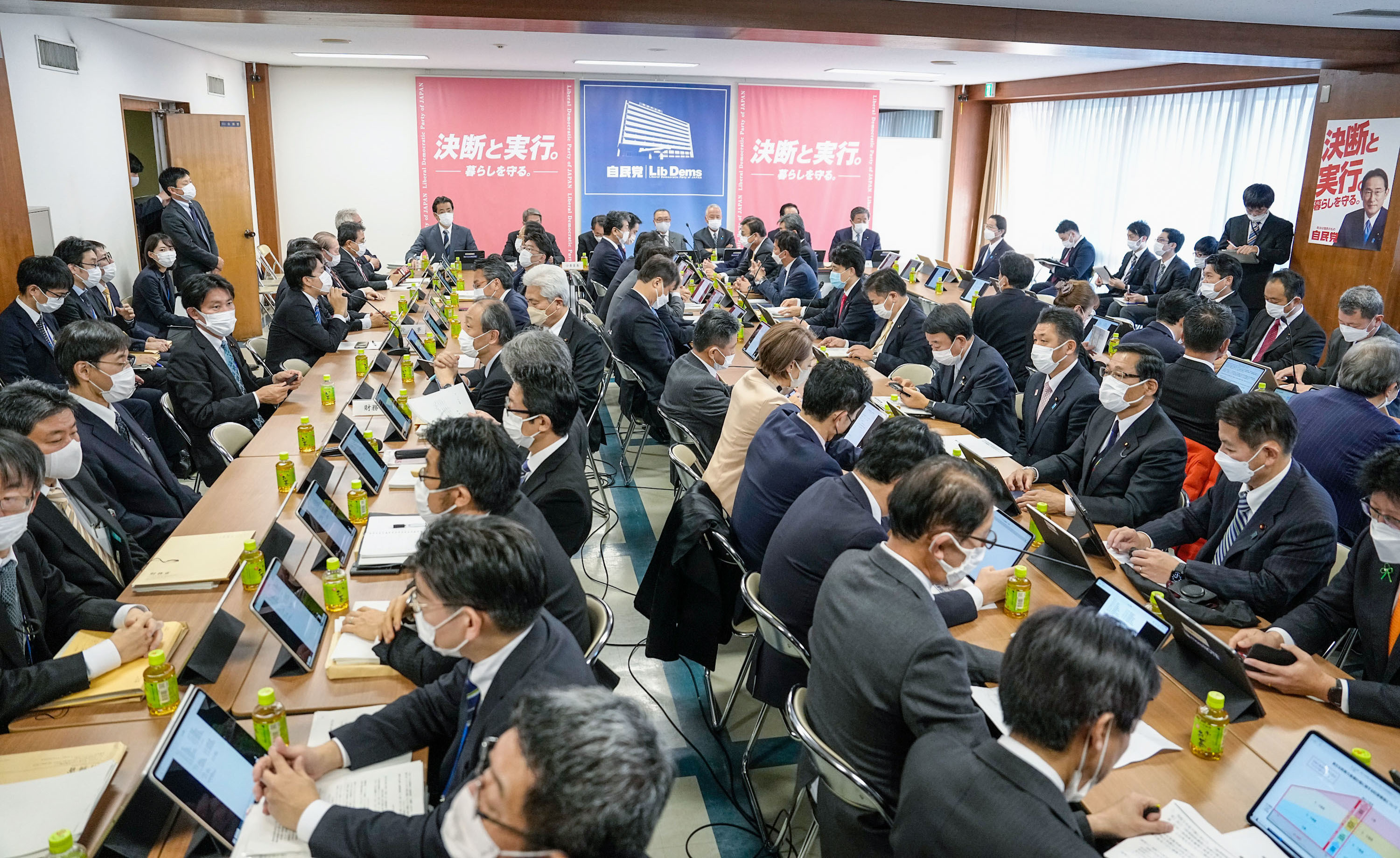- Article
- Intergenerational Issues
Writing Fiscal Responsibility into the Social Contract
July 31, 2017

As the Abe cabinet eyes corporate-level reforms to spur growth, economist Keiichiro Kobayashi suggests that the real source of Japan’s malaise is uncertainty over the sustainability of government finances. To address this deeper problem, he argues, will require a new intergenerational social contract.
* * *
In the latest version of Basic Policies for Economic and Fiscal Management and Reform, approved on June 9, the cabinet of Prime Minister Shinzo Abe highlights “work-style reform” as a key component of its strategy to revitalize the economy. This is sound policy, as I explain in the first part of this article. But as I argue in the second part, corporate-level reforms will not be enough to overcome Japan’s economic inertia unless coupled with a new commitment to controlling the fiscal deficit.
To accelerate economic growth, Japan needs to boost productivity. And to boost productivity, corporations need to respond nimbly to changes in the business environment through the reallocation of resources. Japan’s Stewardship Code and Corporate Governance Code adopted in 2015 were part of an attempt to accelerate reallocation by making management more responsive to corporate shareholders. However, a bigger obstacle to reallocation is the inefficiency and unresponsiveness of Japan’s labor market owing to low labor mobility. The aim of work-style reform is to encourage the adoption of more flexible employment models to boost labor mobility and increase productivity.
Japanese management reforms carried out to date have had only a limited impact on employment practices and labor mobility. If implemented, Abe’s work-style reforms may give rise to an external labor market that will better match workers and employers, and the productivity of Japanese industry will surely rise as a result. In this way, work-style reform and governance reform can be expected to complement one another and act as twin engines for economic growth. In my view, the 2017 edition of Basic Policies makes important progress by identifying strategies for stimulating growth at the microeconomic level of workers and employers.
Addressing the Elephant in the Room
For all that, a deeper macroeconomic malaise threatens to negate the effect of such reforms if not addressed. I refer to the economic uncertainty and anxiety fueled by Japan’s massive and ever-growing government debt.
Of course, the 2017 Basic Policies are not entirely silent on the matter of fiscal consolidation. In the latest roadmap, the government reiterates its goal of “achieving a primary surplus by fiscal year 2020.” This time, however, it has paired that target with the more easily attainable aim of “steadily reducing the public-debt-to-GDP ratio.” The addition has raised suspicions that the next move will be to replace the former target with the latter, fueling doubts about the government’s commitment to fiscal discipline.
Japan’s budget for fiscal 2017 (general account) is just shy of 100 trillion, and a full 30 trillion of that is covered by new government bond issues. What this means is that 30% of government spending in the current fiscal year is being financed by fresh borrowing. Faster economic growth will not remedy this situation. If the growth rate improves, interest rates will also rise, and with the national debt in excess of 1,000 trillion, a 1-point rate increase will add another 10 trillion in interest to the debt (over the long term). Economic growth currently stands at less than 1%, and according to a recent study, even at 2% growth, the government would need to raise the consumption tax to around 30% (from the current 8%) to stabilize the debt-to-GDP ratio over the next few decades and achieve long-term fiscal sustainability. At the current tax rate, even 4% growth would fail to stem the growth of Japan’s public debt.
Uncertainty about the sustainability of government finances and the social security system is fueling widespread anxiety about our economic future. For most people, these are vague, inchoate worries, but at their heart lies the possibility, however, remote, of a sovereign debt crisis like the one Greece experienced. To be sure, the probability of a Japanese fiscal meltdown in the foreseeable future is quite low, but new studies have shown how exposure to such “tail risk” (the risk of rare events) can inhibit economic growth. Recently my own research demonstrated theoretically that sovereign-debt tail risk could be a reason for the long-term sluggishness of the Japanese economy.
If sovereign tail risk is at the bottom of Japan’s glacial economic growth, then no amount of effort to reform labor or governance practices at the microeconomic level will be sufficient to put the economy back on a growth trajectory. This forces us to confront the paradox that fiscal rehabilitation to eliminate the long-term risk of a debt crisis is one key to stimulating economic growth in the short term.
Intergenerational Ethics and the Budget
It is self-evident to most people with an understanding of economics and government finances that we need to restore fiscal sustainability in order to remove the long-term economic uncertainty that is inhibiting Japan’s economic growth. Why, then, does this knowledge not spur our political leaders to action? In a recent book I co-authored, Zaisei to minshushugi (Public Finance and Democracy)—the outgrowth of a Tokyo Foundation research project—I approach this as an intergenerational dilemma and conclude that major changes in our political decision-making systems will ultimately be required to reconcile the interests of present and future generations and bring government debt under control.
The nature of the dilemma can be summarized as follows. Rehabilitation of public finances during our lifetimes would benefit many generations to come by helping to ensure economic stability. But for current generations, it would involve painful spending cuts and tax increases with no prospect of a payoff within their lifetime. Structurally, the issue resembles the dilemma of an overcrowded lifeboat. Unless someone jumps overboard, the lifeboat will sink, drowning everyone.
In essence, the problem of deficit spending is an intergenerational lifeboat dilemma. As I see it, the reason we find it so difficult to resolve this problem is that the present generations are not sufficiently motivated to act altruistically on behalf of generations to come. If they were, they might be willing to make sacrifices in order to rehabilitate government finances and save those generations from a much heavier burden, instead of passing the costs on to them.
Promoting Intergenerational Altruism
Classical economics offers no answer to this dilemma. In a society made up of individuals motivated by rational self-interest, there is no solution to the problem of intergenerational inequity. (Since the dilemma and its consequences do not occur repeatedly, one cannot apply the “iterated prisoner’s dilemma” game to this situation.) Fortunately, under the right conditions, human beings often do agree to cooperate for the greater good. The problem is how to promote altruistic cooperation with generations that do not yet exist.
In recent years, a number of countries have attempted to promote responsibility toward the future and create an environment for fiscal sustainability through the establishment of nonpartisan organs that publish independent, long-range fiscal forecasts and projections. The Tokyo Foundation recommended the establishment of such an organ in its November 2013 policy proposal “Creating an Independent Office for Fiscal Projections.” The basic idea is to insert a spokesperson for future generations into the policy-making process so as to encourage intergenerational altruism.
It is difficult to envision a solution to the problem of ballooning public debt unless future generations can make their voice heard in budget deliberations and policy debates. Economist Tatsuyoshi Saijo and his research team at the Kochi University of Technology have coined the term “virtual future generations” to refer to such mechanisms for intergenerational equity and have gone so far as to propose the establishment of a “ministry of the future” to review all government policy from the perspective of future generations.
Toward a New Social Contract
In the seventeenth and eighteenth centuries, Enlightenment thinkers like John Locke and Jean-Jacques Rousseau developed the theory of the social contract to explain and justify the

existence of political authority. The starting point for this theory was the notion that human beings “in a state of nature” will opt freely, out of rational motives, to cede some of their rights to a central authority. Today, as we face the twenty-first-century dilemma of intergenerational sustainability, we stand in need of a new social contract.
This time, the starting point must be John Rawls’s “original state,” in which human beings are equal and shielded from any knowledge of their own past, present, or future position in society by a “veil of ignorance.” In this hypothetical state, ignorant even of what generation they would be born into, human beings, acting out of rational self-interest, would freely opt to support intergenerational equity by creating an organ designed to protect the interests of the least advantaged generations.
The fiscal deficit is a conventional economic policy issue for our leaders insofar as the uncertainty caused by our ballooning debt is holding down economic growth. However, in its essence, the problem of fiscal discipline embodies the new twenty-first-century dilemma of intergenerational equity in public policy. Today that unprecedented challenge is spurring efforts to develop a political philosophy that can form the theoretical underpinning for a new social contract.


